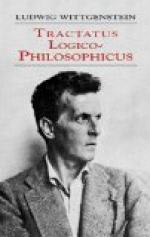5.123 If a god creates a world in which certain propositions are true, then by that very act he also creates a world in which all the propositions that follow from them come true. And similarly he could not create a world in which the proposition ‘p’ was true without creating all its objects.
5.124 A proposition affirms every proposition that follows from it.
5.1241 ‘p . q’ is one of the propositions that affirm ‘p’ and at the same time one of the propositions that affirm ‘q’. Two propositions are opposed to one another if there is no proposition with a sense, that affirms them both. Every proposition that contradicts another negate it.
5.13 When the truth of one proposition follows from the truth of others, we can see this from the structure of the proposition.
5.131 If the truth of one proposition follows from the truth of others, this finds expression in relations in which the forms of the propositions stand to one another: nor is it necessary for us to set up these relations between them, by combining them with one another in a single proposition; on the contrary, the relations are internal, and their existence is an immediate result of the existence of the propositions.
5.1311 When we infer q from p C q and Pp, the relation between the propositional forms of ‘p C q’ and ‘Pp’ is masked, in this case, by our mode of signifying. But if instead of ‘p C q’ we write, for example, ’p|q . | . p|q’, and instead of ‘Pp’, ‘p|p’ (p|q = neither p nor q), then the inner connexion becomes obvious. (The possibility of inference from (x) . fx to fa shows that the symbol (x) . fx itself has generality in it.)
5.132 If p follows from q, I can make an inference from q to p, deduce p from q. The nature of the inference can be gathered only from the two propositions. They themselves are the only possible justification of the inference. ‘Laws of inference’, which are supposed to justify inferences, as in the works of Frege and Russell, have no sense, and would be superfluous.
5.133 All deductions are made a priori.
5.134 One elementary proposition cannot be deduced form another.
5.135 There is no possible way of making an inference form the existence of one situation to the existence of another, entirely different situation.
5.136 There is no causal nexus to justify such an inference.
5.1361 We cannot infer the events of the future from those of the present. Belief in the causal nexus is superstition.
5.1362 The freedom of the will consists in the impossibility of knowing actions that still lie in the future. We could know them only if causality were an inner necessity like that of logical inference.—The connexion between knowledge and what is known is that of logical necessity. (’A knows that p is the case’, has no sense if p is a tautology.)
5.1363 If the truth of a proposition does not follow from the fact that it is self-evident to us, then its self-evidence in no way justifies our belief in its truth.




